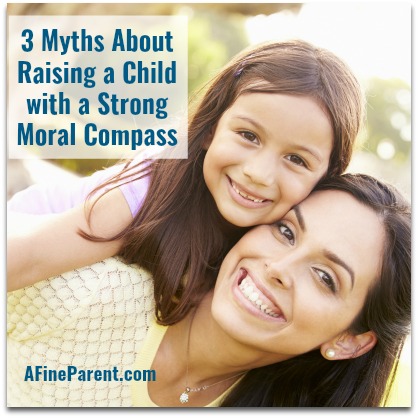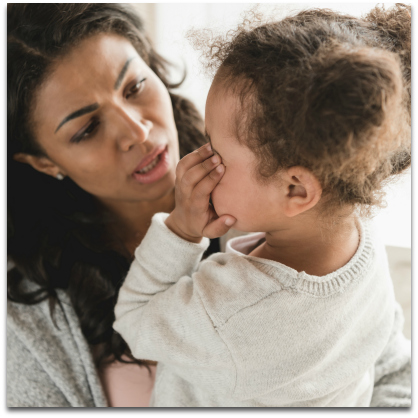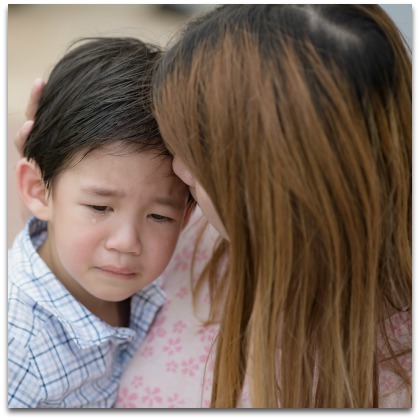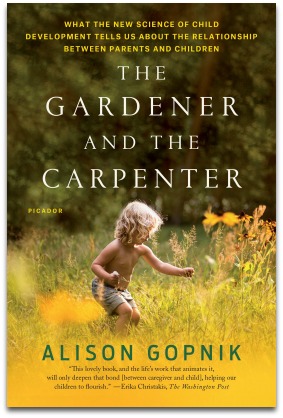 What would your child do in the following situations?
What would your child do in the following situations?
⇒ Your child sees some kids on the playground laughing at another child.
⇒ Your child sees someone drop money without noticing.
⇒ Your child breaks a framed photo while playing ball in the living room.
We hope they will say something to the mean kids. We hope they will chase after the person who dropped the money. We hope they will tell us when accidents happen and make different choices in the future.
We hope our child will do the right thing when no one is looking.
A child who knows what the right thing to do is, even if it’s hard, has a strong inner compass. Whether we call our inner compass a “conscience” or “having good character” or “strong morals,” we want our child to have an inner voice that guides them to be a good person.
How do we help our child develop this inner sense of right and wrong?
Here are 3 common parenting myths that get in the way of helping our children develop a strong inner compass, and three alternatives to use.
Myth #1: Kids Need a Lot of Rules
 “Don’t jump on the couch!” “No hitting!” “No calling people stupid!”
“Don’t jump on the couch!” “No hitting!” “No calling people stupid!”
How much does this help though?
Try this instead: Focus on values, not rules. When we have clearly defined what’s important to us as a family, our child internalizes our values and can use them to guide their behavior in any situation.
Teaching kids values instead of rules helps them internalize our values and use them to guide their behavior.
Perhaps your family guiding principle is, “Be kind” or “Don’t hurt people or things.” As our child grows, we use this principle as we correct their behavior: “Sweetheart, I know you really wanted that toy. Is it kind to take it? Look how sad your brother is! Can you give the toy back please? We always try to be kind in our family.”
You might be tempted to say, “No taking toys.” But that doesn’t help your child understand and internalize the “why.” As our child grows and feels a sense of belonging in the family, they internalize the value and identify with it: “In our family, we are kind.”
Guiding and correcting behavior with values instead of rules teaches kids to think for themselves.
As children grow and become more independent (we won’t be following them around forever!) they need to be able to make decisions at school or out in the world. At every decision making moment, our child can use our family value to decide what to do.
If your family guiding principle is “Don’t hurt people or things,” when your child sees someone drop money, they will be able to think about how keeping the money would hurt the person and they will run after it and give it back.
If your family value is “Be kind,” your child will not join in the playground teasing and can go and get a teacher.
When we focus on values, our child learns to think for themselves and decide right from wrong.
They have a big picture idea to help them understand not only the situation at hand, but how to be in the world.
Our child learns to think critically instead of ‘following the rules’ or just doing what they are told.
Another hidden side-effect of having a lot of rules: It encourages kids to look for the loopholes! When kids don’t have an intrinsic understanding of WHY we have certain expectations of them and for them, they will try to find a way around the rules. Leading with values helps avoid this.
Myth #2: Kids Need Consequences
 Having a strong inner compass means we are guided by how our actions affect others. Consequences make our child think, “What’s in it for me?”
Having a strong inner compass means we are guided by how our actions affect others. Consequences make our child think, “What’s in it for me?”
Try this instead: Help your child understand how their actions affect others and be motivated to help them make different choices.
Let’s say your child is playing ball in the house and breaks your favorite photo frame. You would be justifiably upset! You might even want to make your child feel bad so that they never do that again, so you say no iPad privileges for a week. That will make them remember not to play ball in the house!
But guess what? You’ve just taught your child to think about how their actions affected THEM not how they affected YOU.
Your child broke your picture frame and now they don’t get to use the iPad. They’re now only thinking about themself. To choose right from wrong, we have to be aware of how our actions affect others not just how they affect US.
First, react from a place of calm. We can say, “Oh no! My favorite frame. This is the one you kids gave me for Mother’s Day. I’m so sad.” Our child gets to see how their actions affected us.
Try to resist the urge to yell or scold. It’s impossible for a child to feel empathy for another person or feel regret for their actions if they are feeling under attack. (Think about how hard it is as as an adult to apologize or even admit you’re wrong if another person is attacking you!)
Our child can only feel remorse if they don’t feel attacked. If we resist the urge to make them feel bad to teach a lesson, they can actually let themselves see the real consequences of their actions and feel regret. It is that regret that helps them to make a better choice next time.
If we let our child see how their actions affect others instead of making them feel bad to try to influence their future behavior, they learn to make right choices even when it’s hard.
It’s not all about THEM: “I really want to play ball in the house, but I won’t because I don’t want my mom to feel sad if I break something.”
And if we don’t shame them or punish them, they will WANT to make amends. A child looking at his sad mama holding her favorite frame- who is NOT given consequences- will be able to spontaneously say, “I’m sorry, mama! Can we fix it?”
Isn’t that what we all want? A child who feels moved to make things right when they’ve made a mistake or a bad choice? That is what we mean when we say we have to do or say something ‘in good conscience.’
By definition, a strong conscience, good character, or a strong inner compass HAS to come from within. They develop this empathic understanding by understanding how their actions affect others. Consequences get in the way by teaching our child to think about, “what happens to ME when I do XYZ?” Our child has to genuinely care about others, not just themself, to be able to do the right thing when no one is looking.
Another hidden side-effects of consequences: Consequences teach kids to lie if they’re only thinking about what will happen to them. “Who me? I don’t know how that got broken.” If your child isn’t afraid of what you might do, they can be honest with you and come to you when they make a mistake.
Myth #3: Kids Need Us to Shape and Control Them to Become Good People.
 Most of us are afraid that if we are not hands-on, all-in, shaping our child, they won’t learn what they need to learn or develop into good people. We parent from a place of fear.
Most of us are afraid that if we are not hands-on, all-in, shaping our child, they won’t learn what they need to learn or develop into good people. We parent from a place of fear.
Try this instead: Choose love. Emphasize connection and your relationship with your child and trust the process of your child’s growth and development.
Alison Gopnik writes in her book, The Gardener and the Carpenter: What the New Science of Child Development Tells Us About the Relationship Between Parents and Children, that we need to provide the conditions under which our child will thrive much as a gardener tends a plant.
“Our job as parents is not to make a particular kind of child. Instead, our job is to provide a protected space of love, safety, and stability in which children… can flourish. Our job is not to shape our children’s minds; it’s to let those minds explore all the possibilities that the world allows. Our job is not to tell children how to play; it’s to give them the toys and pick the toys up again after the kids are done. We can’t make children learn, but we can let them learn.”
Ask yourself not, “What do I need to do to my child? How can I control their behavior?” but “What do I need to do to serve our relationship and trust in the process?”
If we want our children to develop a strong inner compass, we need to focus on values instead of rules. When they internalize our values they develop an inner sense of right and wrong so that they can think for themselves and do the right thing when no one’s looking.
If we want our children to choose right over wrong, we need to treat them with empathy and understanding so they can develop empathy and learn how their actions affect others.
Finally, as Gordon Neufeld says, we must embrace that “parenting is providing the conditions in which a child can realize his or her full human potential.” We have resist the urge to “build” and control and trust that children have within them everything they need to thrive and grow into wonderful human beings.
2-Minute Action Plan for Fine Parents
Take 2 minutes to think about what your deepest value is as a family. Really, 2 minutes. The reason it only takes 2 minutes is because you already KNOW it.
Ask yourself these questions: “What do I want to teach my children? What would be the highest compliment someone could give them or me?” When I ask myself these questions, I know the guiding value I have for my family is “be kind.” Know what it is for you so you can let it guide your parenting choices.
Long-Term Action Plan for Fine Parents
Use the big ideas above when your child misbehaves or makes a mistake. For example, say your child is pulling the dog’s tail.
1- Use your family value when you need to teach or correct your child instead of focusing on ‘the rules.’ Ask yourself, “When I think about my family value, how can I help my child understand why this correction needs to be made?” What about their behavior conflicts with our family values? Explain to your child what needs to be different from this perspective. “Sweetie, please touch Ranger gently. Remember, in our family we are always kind.”
2- Instead of consequences, help your child understand how their actions affect others. “That will hurt Ranger if you pull his tail.”
3- Choose love as you correct your child. Protect your relationship. Even if you’ve said it 1,000 times, respond to your child with empathy and patience, knowing that they are doing the best they can. Your child WILL eventually learn!
Thank you for this very important article. We need to remember to teach children (and ourselves) that kindness doesn’t apply just to others; we must also be kind to ourselves as well. That means kids must be allowed to have emotions, make mistakes, and show vulnerability without risk of being ridiculed, shamed, or made smaller.
You’re right, focus on value not the rule. Because children have a natural defensive reaction in their thinking, don’t force them to do this, don’t do that, but explain to them the gains and losses caused by their actions.
Hey. Wonderful article. I also asked myself this question. It seems to me that there should be complete mutual understanding between you. Discuss everyday life with your child, be not only his teacher, but also a friend. Help me feel that you can get help and advice from you at any moment, make the family house a fortress for him, in which they will listen and help him. Convince your offspring that he is the smith of his life, his failures and successes. Great people grow up in an atmosphere of love and understanding. You need to love your children. Even if in your schedule it is impossible to find a lot of time for a child, use it as efficiently as possible. Reading books, going to the theater, outdoor recreation – incredibly positive impact on your relationship and accustom your child to useful activities. Good luck.
Hi, I have a question. I’ve been a casual follower of A Fine Parent for years and have read three of Daniel Siegel’s books (among several others), so I’m pretty in tune with my 5 year old daughter and her emotional states (most of the time) and my own. She has started increasing her frequency of white lies. I think she has gotten away with a few in the recent past and is learning how to get better at it. She’s generally not interested in things that require hard work and she often looks for short cuts/loopholes to avoid things she doesn’t like (drinking her milk, cleaning her room, washing her hands after the bathroom, etc.). She’s otherwise very loving, doesn’t throw tantrums, and has an amazing creative streak. Her 7 year old brother is a conscientious, by the book kid and they have a great relationship.
Though I am calm and meditative when she does lie and I explain the why and how it makes others (including me) feel, I get the sense she’s half in and half out. Meaning, she gets the empathy but also seems to not care. She seems to be looking for a way to avoid the negative feelings of empathy and then just go back to acting like a funny silly 5-year old.
So my question is, what is best if ‘consequences’ (Myth 2 from this article) are not used? My thinking (based on Skinner’s Operant Conditioning) is that I should employ a consequence where I remove something of value for a time and return it once she’s recognized it’s loss, and this will help eliminate the undesired behavior. Specifically in my case, she loves the iPad (side note, I hate screens and wish they were never invented, but….here we are), so wouldn’t removing it coupled with the other strategies of empathy and connection be appropriate? In life, all actions have consequences and that’s a lesson I’d like to teach. She can’t immediately see how her white lies are hurtful to others or the downside of doing so (people will stop believing her in the long term). I’d like to not punish (it works temporarily before the bad behavior resurfaces), so what do I do in this case?
Any constructive commentary or clarification questions are very much appreciated. Thank you!
Hello Vikram!
I would be interested in the kinds of things she lies about. It sounds to me that you are talking about things like, “Yes I cleaned my room” or “yes I washed my hands.”
I hear that you are very worried that she doesn’t care about being truthful and worse maybe she never will!
Try to take a deep breath. She’s only 5. At this age it is VERY common for kids to lie from ‘wishful thinking.’ Try not to take this so seriously. It’s developmentally appropriate. Studies have also shown that kids who lie have a higher IQ 🙂
I would find ways to circumvent the question. For example, “Hey, show me your clean room!” or “Let me smell your freshly washed hands!” in a lighthearted manner. If she lies about something you know to be untrue, I would say with a smile, “I think you wish that were true! Come on now! Let’s go…”
She will learn there is no point in trying to fool you.
In terms of consequences, I think you would really like the book Unconditional Parenting by Alfie Kohn. It is a thoroughly research-backed that makes the case that consequences just do not work.
I hope that helps!
The lies are small. Mostly inconsequential themselves, but they are a few data points among others. Others like yesterday she teased another kid weaker than him and she didn’t understand why that was wrong. My thinking is that she she needs to have her empathy skill nurtured. Or at least have an understanding of the Golden Rule. I spoke to some other dads this morning who have older kids (teens and twenties) and they said social feedback does lots of the heavy lifting as long as the parent provides unconditional love and support. Anyway, I’ll work on the examples you’ve laid out (seem similar to ‘connect and redirect’) and just keep the space between action and my reaction to give room to practice. Thanks!!
This article is spot on and provides really good examples.
I always find examples really make a difference. Glad you liked it 🙂
Thank you. I loved this. It just makes sense.
I’m glad you liked it! 🙂